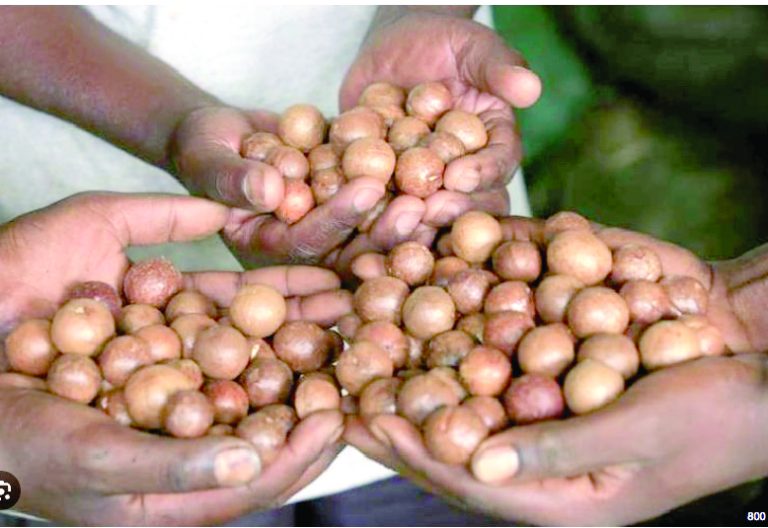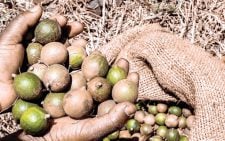Macadamia sector at a crossroads as players differ on export of nuts

Kenya’s macadamia industry is at a crossroads with stakeholders cracking their heads over the best path forward and two lobbies charting different paths over exports of the nut.
This after the Macadamia Nut Association (MACNUT) threw its weight behind the government’s ban on exporting unprocessed nuts, a move they claim could inject over $80 million into the economy and create 30,000 jobs.
MACNUT argues that keeping the nuts at home for processing not only bolsters local industries but also safeguards Kenya’s competitive edge in the global market.
“We urge the government to maintain its policy on raw macadamia exports to protect local processing industries. This action is vital for ensuring the long-term sustainability of the sector, safeguarding jobs, and maintaining Kenya’s competitive edge in the global market,” the lobby stated in a press release.
However, not everyone is cracking open the nut.
The Nut Traders Association of Kenya (NUTAK) contends that the ban disproportionately favours processors and is nibbling away at government revenue.
They argue that the plight of traders with containers of nuts languishing in warehouses, awaiting export licenses is bad for the sector and the economy.
Speaking at a meeting, Johnson Kihara, NUTAK chairperson, appealed to President and his deputy to ensure the regulator uphold the High Court order, stating that the delay to allow exportation of the in-shell nuts to the international market was denying the government billions of shillings in revenue as a container was charged Sh53,000.
MACNUT, however, believes raw nut exports primarily benefit traders, limiting job creation and farmer income, and are often linked to unethical practices like underreporting export volumes and selling substandard nuts.
“There are reports of traders colluding with unscrupulous farmers to bypass regulations, resulting in the sale of substandard or unripe nuts that do not meet international quality standards. This not only jeopardizes Kenya’s reputation in the global market but also diminishes the potential earnings for farmers who invest in quality production,” the association notes.
Value-added processing has helped create jobs for the youth, higher revenues for the country, diversified markets in Africa, the US, Europe, Asia, and the Middle East, benefiting 200,000 smallholder farmers.
The two categories of nut traders, processed and raw macadamia nut traders, have been in a raw since the implementation of the ban, with both sides urging the government to side with their cause.
Last year, macadamia farmers from the Mt Kenya region came out to appeal to the government to review the AFA’s Act to allow the exportation of raw nuts, arguing that the restriction of the raw macadamia nuts has given the local processors an unfair advantage to buy the nuts at paltry prices.
“A law can only be good if it serves Kenyans. This law does not serve us as Kenyans. As long as it is there, we will continue being at the mercy of a few processors,” Kihara had said.
He added that since the ban was lifted, macadamia exports fetched Sh8 billion with over 60,000 tonnes exported annually, though only 40,000 tonnes were recorded by the government.
Another lobby however, claimed that the country had lost revenue amounting to over $50 million (Sh6.4 billion) in the previous year from macadamia nuts exports as a result of the ban suspension.
Unprocessed nuts
Jane Maigua, chairperson of the MACNUT Association, explained that the government of Kenya had lost $20 million (Sh2.5 billion) from export as raw unprocessed nuts in shell.
“The other $30 million (Sh3.8 billion) is from post-harvest losses which also means loss of income to the government (taxes) due to the decline in local processing and exports,” Maigua said.
The association also argued that the direct export of raw, unprocessed macadamia nuts has created an uneven playing field for local processors who actually offer higher prices to local farmers, which as a result, local processors had reported losses exceeding 50 per cent in the last year, with many forced to close or face debt collectors.
The government initially imposed the ban in 2009, temporarily lifted it last year to encourage competition, and then reinstated it in November 2024, leading to the current court order.
MACNUT emphasizes the need for a balanced approach that considers the interests of farmers, processors, and the overall economy.















